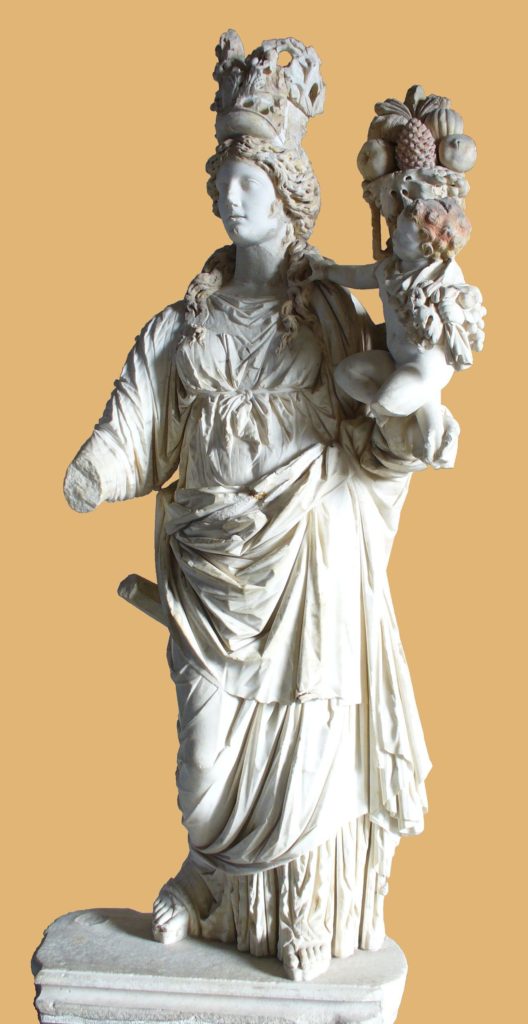Translated by Steven J. Willett

The Goddess Tyche (Fortune) Holding the Baby Plutus (Wealth) in a Roman copy 2nd. Century AD from a Hellenistic Original, Istanbul Archeological Museum
Note: The key issue in Parts 5 and 6 is the unexpected and originally unperceived entrance of the divine into human life. The Manifest Ones dispensed gifts that satisfied all mortal desires, but it was a single one, wealth, that corrupted them. This tendency continued down to the evolution of historical Greek gods and their accomplishments. For Hölderlin the withered civilization of the Classical world is almost unendurable, and he cannot understand at this point what needs to be done for a new restoration. Both parts make repeated use of the words Nur (Now) and Warum (Why) to deal with his confusion. For this Classicist and many of my scholarly friends, the relatively sudden intrusion of the so-called woke culture brings us back to Thebe welkt und Athen (“Thebes and Athens are sere”). The Greek pantheistic phrase Ἓν καὶ Πᾶν (One and All) in Part 5:12 appealed to Hölderlin’s own consciousness of nature’s unity.
5. Unperceived they come at first, and around them are jostling Only the children, too bright coming, too dazzling the joy, And the men avoid them, a demigod scarcely knows how to utter Who by names they may be, ones approaching with gifts. But the courage of them is great, and fills in his heart so deeply Their delight and just knows barely to make use of wealth, Grapples, lavishes and quickly becomes for him Unholiness holy, That with his hallowing hand foolish and kindly he touched. Likely the Heavenly Ones will endure this; but then in truth starkly Come themselves and inured grow all the people to joy And the day and to view the Manifest Ones, their very own faces Who, in the ages long past, carried the name One and All, Deep in the hidden breasts and with free satisfaction inflated, And at first and alone all their desires were fulfilled. So is mankind; when wealth is there, and attends with presents Even a god just for him, knows he and sees he it not. Suffer he must, at first; but now he names his dearest possession, Now, now must for all that words, like the flowers, arise. 6. And now thinks he to honor the blessed gods in earnest,Truly and truthfully must everyone offer their praise.Nothing may view the light, that High Ones find displeasing, For the Aether a work idly pursued is unfit. Thus in the presence of Heavenly Ones to stand deservedly,Ordered in cordial regimes nations arising competeEach with the other and build the beautiful temples and cities Strong and noble, they rise over the waterside banks— But where are they? where bloom the Famed, the festival’s garlands? Thebes and Athens are sere; thunder the weapons no more In Olympia, nor the golden chariots of the game competition, And becrowning themselves never Corinthian ships? Why are they also silent, the ancient and sacred playhouses? Why do they now delight not in the consecrate dance? Why inscribes, as once, foreheads of the mortal a god not now, Prints the branding, as once, not on the stricken one deep? Or he came also himself and adopted the stature of mortals And perfected and closed comforting heavenly feast.

What is the age of the statue?
The approximate age of the statue is listed under the image. Slight amounts of the original coloring still exist on it. Everyone who enjoys white marble statuary should understand that it was colorfully painted. If you stand today far below the two pediments of the Parthenon, you can imagine how important colors would be to perceive the triangular cluster of gods.